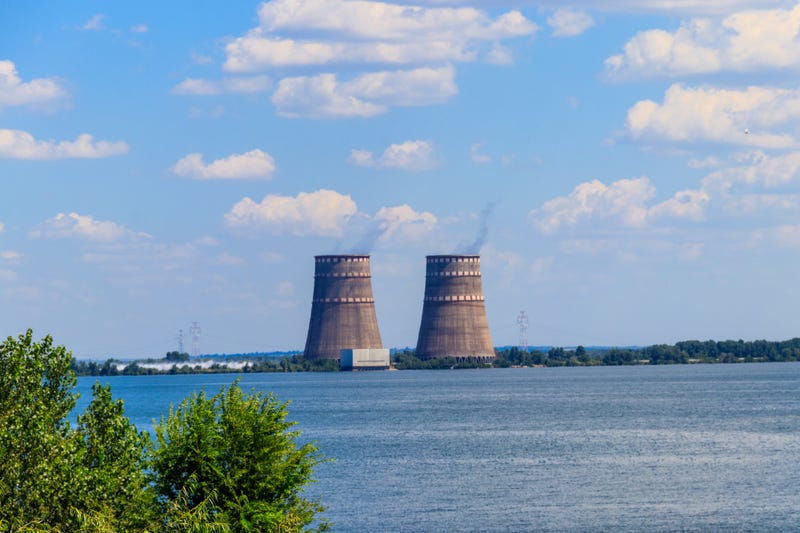
Russian forces advanced towards the Zaporizhzhya nuclear power plant – described as “the largest nuclear power plant in Europe” on its website – at around 4:30 p.m. EST, according to the International Atomic Energy Agency (IAEA).
“Ukraine informed the International Atomic Energy Agency (IAEA) today that a large number of Russian tanks and infantry ‘broke through the block-post’ to the town of Enerhodar, a few kilometres from the Zaporizhzhia Nuclear Power Plant (NPP),” IAEA Director General Rafael Mariano Grossi said.
A fire broke out due to the attack and two people were injured, said the IAEA.
A day before, a crowd was gathered on a road leading to the plant to prevent troops from entering Enerhodar. Drone footage showed barricades of cars, trucks, tires and sandbags with Ukrainian flags flying, according to The Washington Post.
Dmitry Orlov, the mayor of Enerhodar, wrote in a Telegram post Wednesday that Russian soldiers and plant employees had met for negotiations, said the outlet. Ukrainian Foreign Minister Dmytro Kuleba tweeted Thursday that Russian forces were firing at the plant.
Additionally, Anton Gerashchenko, an adviser to Ukraine’s Ministry of Internal Affairs, said in a Facebook post that the plant was “protected by the heroes of the National Guard of Ukraine.”
“They won't give up!” he said. “There’s gonna be a fight.”
Zaporizhzhya is located on the shores of the Kakhovka Reservoir in the Zaporizhzhya region of Ukraine.
“Every year since 1984, the contribution of Zaporizhzhya NPP to Ukraine's energy sector has increased from 2 percent to 20.4 percent (1/5 of all electricity generated in Ukraine),” said the plant website. “The NPP provides a set of measures to ensure safe and environmentally friendly electricity generation.”
In an update that Russian forces were advancing towards the plant, Grossi urged “military forces to refrain from using violence near the plant.”
According to Gerashchenko’s translated Facebook post, forces “will not be able to penetrate the concrete shell of the reactor, but they will surely damage transformers, turbines and other equipment necessary for the safety of the nuclear power plant.”
He said an accident such as the 1986 Chernobyl nuclear power plant disaster could occur and urged Russian forces to change their minds.
“Do not create conditions for the new Chernobyl,” he said. “Radiation knows no nationalities, one does not spare anyone!”
According to the IAEA, the Ukraine regulatory authority sent an urgent letter to the agency that said Russian infantry troops were moving directly towards the site and that the situation was “critical.”
Grossi has appealed for an immediate halt to the use of force at Enerhodar and called on the military forces operating there to refrain from violence near the nuclear power plant. He also said the IAEA “continues to consult with Ukraine and others with a view to provide maximum possible assistance to the country as it seeks to maintain nuclear safety and security in the current difficult circumstances.”
According to the Associated Press, Russian forces shelled the nuclear plant early Friday (Ukraine time), sparking a fire, raising fears that radiation could leak from the damaged power station. The outlet said the fire was in one of the six reactors at the plant, citing a what plant spokesman Andriy Tuz told Ukrainian television. Although the reactor is under renovation and not operating, there is nuclear fuel inside, he said.
While the IAEA tweeted that a Ukrainian regulator said there were no changes of radiation levels at the plant, the AP reported that an official who requested to remain anonymous said that elevated levels of radiation were detected near Zaporizhzhia.
By 9 a.m. Friday EST, the IAEA reported a fire caused by a projectile that “hit a training building in the vicinity of one of the plant’s reactor units,” was later extinguished. Safety systems for the plant’s six reactors had not been affected and there has been no release of radioactive material, said the agency.
Radiation monitoring systems at the site are also fully functional and there had been no release of radioactive material, Grossi said.
“However, the operator has reported that the situation remains very challenging and therefore it has not yet been possible to access the whole site to assess that all safety systems are fully functional,” said the IAEA.
“I’m extremely concerned about the situation at the Zaporizhzhia NPP and what happened there during the night,” said Grossi. “Firing shells in the area of a nuclear power plant violates the fundamental principle that the physical integrity of nuclear facilities must be maintained and kept safe at all time.”


